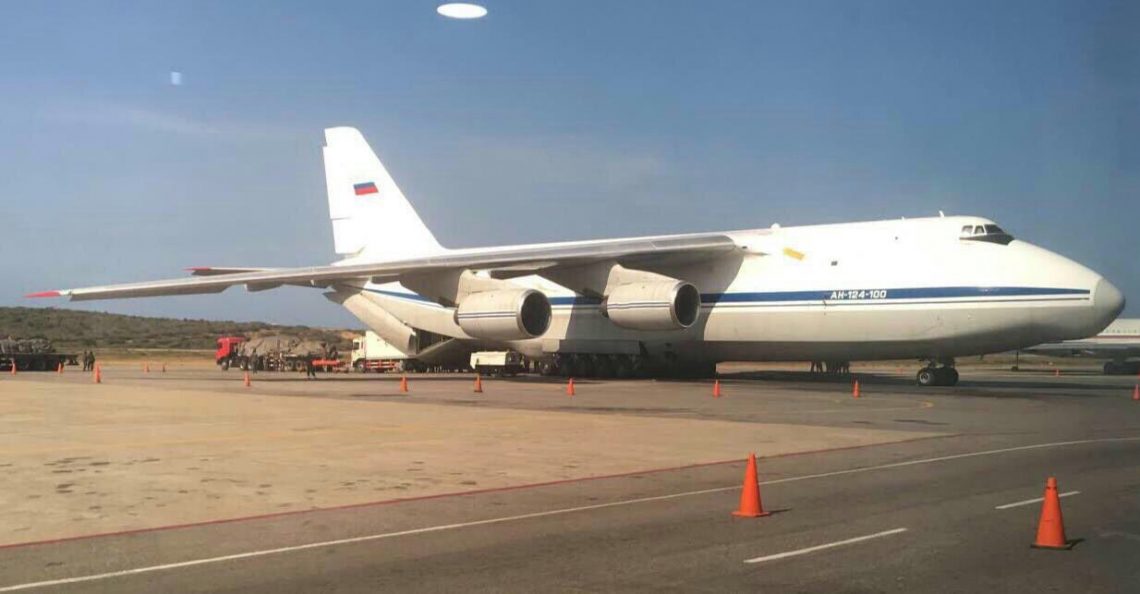Rusija počela slati vojsku u Venezuelu
Page 1 of 11
Page 1 of 11 • 1, 2, 3 ... 9, 10, 11 
 Re: Rusija počela slati vojsku u Venezuelu
Re: Rusija počela slati vojsku u Venezuelu
Russia sends troops to Venezuela in message to Trump administration

The Russian Defense Ministry send An-124 military transport aircraft, IL-62M jet airliner and more than 100 troops to Caracas, against the backdrop of growing tensions between Venezuela and the U.S.
Some source claims that Chief of the General Staff of the Ground Forces Col. Gen. Vasily Tonkoshkurov have arrived with troops.
According to media reports in recent days, General Vasily Tonkoshkurov, arrived in the capital of Venezuela with almost 100 troops. In addition, An-124 brought 35 tonnes of equipment. What arrived in containers is still unknown.

The Russian Defense Ministry send An-124 military transport aircraft, IL-62M jet airliner and more than 100 troops to Caracas, against the backdrop of growing tensions between Venezuela and the U.S.
Some source claims that Chief of the General Staff of the Ground Forces Col. Gen. Vasily Tonkoshkurov have arrived with troops.
According to media reports in recent days, General Vasily Tonkoshkurov, arrived in the capital of Venezuela with almost 100 troops. In addition, An-124 brought 35 tonnes of equipment. What arrived in containers is still unknown.

Hektorović- Posts : 26373
2018-04-10
 Re: Rusija počela slati vojsku u Venezuelu
Re: Rusija počela slati vojsku u Venezuelu
Drugačije se ni nemre spričit imperijaliste da unište još jednu zemlju.
Baš čitam članak o Ledeen doktrini. Ameri su psihopate.
Baš čitam članak o Ledeen doktrini. Ameri su psihopate.
_________________
I ask not for a lighter burden, but for broader shoulders.

AlfaOmega- Posts : 10386
2015-09-11
 Re: Rusija počela slati vojsku u Venezuelu
Re: Rusija počela slati vojsku u Venezuelu
Americka LEDEEN doktrina koa se moze sazeti u ovoj recenici
"Every ten years or so, the United States needs to pick up some small crappy little country and throw it against the wall, just to show the world we mean business,"
Koje je zlo ta njihova takozvana politicka elita, to je za ne povjerovati.
Michael Arthur Ledeen
https://en.wikipedia.org/wiki/Michael_Ledeen
Kako se ovo svidja dezurnim nasim forumskim idolpoklonicima USA politike.
"Every ten years or so, the United States needs to pick up some small crappy little country and throw it against the wall, just to show the world we mean business,"
Koje je zlo ta njihova takozvana politicka elita, to je za ne povjerovati.
Michael Arthur Ledeen
https://en.wikipedia.org/wiki/Michael_Ledeen
Kako se ovo svidja dezurnim nasim forumskim idolpoklonicima USA politike.

Ringo10- Posts : 21667
2015-09-24
 Re: Rusija počela slati vojsku u Venezuelu
Re: Rusija počela slati vojsku u Venezuelu
Sve više sumnjam da će Ameri vojno intervenirat u Venecueli.

crvenkasti-

Posts : 29707
2014-04-17
 Re: Rusija počela slati vojsku u Venezuelu
Re: Rusija počela slati vojsku u Venezuelu
Ringo10 wrote:Americka LEDEEN doktrina koa se moze sazeti u ovoj recenici
"Every ten years or so, the United States needs to pick up some small crappy little country and throw it against the wall, just to show the world we mean business,"
Koje je zlo ta njihova takozvana politicka elita, to je za ne povjerovati.
Michael Arthur Ledeen
https://en.wikipedia.org/wiki/Michael_Ledeen
Kako se ovo svidja dezurnim nasim forumskim idolpoklonicima USA politike.
zanimljivo...a sta radi Rusija?
_________________
Ima jedan grad koji obiluje inteligentima anacionalnim; kultura ih i svijest, bolje oholost, veze za Italiju, rasa i nagon za Hrvatsku; govore lose dva jezika; Zagreb im je tudj, Italija ih ne treba...

flumen-

Posts : 3221
2015-08-21
Lokacija: : Fiume per sempre
 Re: Rusija počela slati vojsku u Venezuelu
Re: Rusija počela slati vojsku u Venezuelu
AlfaOmega wrote:Drugačije se ni nemre spričit imperijaliste da unište još jednu zemlju.
Baš čitam članak o Ledeen doktrini. Ameri su psihopate.
maduro i chavez su sasvim dovoljno uništili tu zemlju, a imperijalisti su ovdje kubanci koji praktički upravljaju vezezuelom već jako dugo.
svi serete po amerima, je li netko pitao zašto venezuela, koja gladuje, već desetljećima BESPLATNO šalje milijune tona nafte Kubi?
_________________


marcellus- Posts : 46005
2014-04-16
 Re: Rusija počela slati vojsku u Venezuelu
Re: Rusija počela slati vojsku u Venezuelu
dok ameri, kao najveći kupac venezuelanske nafte, tu naftu plaćaju po tržišnoj cijeni?
_________________


marcellus- Posts : 46005
2014-04-16
 Re: Rusija počela slati vojsku u Venezuelu
Re: Rusija počela slati vojsku u Venezuelu
marcellus wrote:dok ameri, kao najveći kupac venezuelanske nafte, tu naftu plaćaju po tržišnoj cijeni?
Kad dodje Maduro na vlast, Ameri ce dobijat venecuelansku naftu besplatno. Sto je i prirodno.

crvenkasti-

Posts : 29707
2014-04-17
 Re: Rusija počela slati vojsku u Venezuelu
Re: Rusija počela slati vojsku u Venezuelu
crvenkasti wrote:marcellus wrote:dok ameri, kao najveći kupac venezuelanske nafte, tu naftu plaćaju po tržišnoj cijeni?
Kad dodje Maduro na vlast, Ameri ce dobijat venecuelansku naftu besplatno. Sto je i prirodno.
misliš kad ode?
Neće, za razliku od Kube ameri nikad nisu naftu uzimali besplatno od svojih saveznika, a trebali su ako mene pitaš
koji će kurac arapskim šeicima lova, ionako samo kupuju jahte i bugatije
_________________


marcellus- Posts : 46005
2014-04-16
 Re: Rusija počela slati vojsku u Venezuelu
Re: Rusija počela slati vojsku u Venezuelu
kamo srece da su Ameri dosli kad je stari krepa 1980...
_________________
Ima jedan grad koji obiluje inteligentima anacionalnim; kultura ih i svijest, bolje oholost, veze za Italiju, rasa i nagon za Hrvatsku; govore lose dva jezika; Zagreb im je tudj, Italija ih ne treba...

flumen-

Posts : 3221
2015-08-21
Lokacija: : Fiume per sempre
 Re: Rusija počela slati vojsku u Venezuelu
Re: Rusija počela slati vojsku u Venezuelu
marcellus wrote:crvenkasti wrote:marcellus wrote:dok ameri, kao najveći kupac venezuelanske nafte, tu naftu plaćaju po tržišnoj cijeni?
Kad dodje Maduro na vlast, Ameri ce dobijat venecuelansku naftu besplatno. Sto je i prirodno.
misliš kad ode?
Neće, za razliku od Kube ameri nikad nisu naftu uzimali besplatno od svojih saveznika, a trebali su ako mene pitaš
koji će kurac arapskim šeicima lova, ionako samo kupuju jahte i bugatije
Amerikancima je gotovo isto dobiti nešto besplatno ili platiti svojim dolarima.
Fora je u tome što su cijeli svijet prisilili da naftu kupuju njihovim dolarima.
To uzrokuje neprestalnu i beskrajnu potražnju za dolarima. Divota.

crvenkasti-

Posts : 29707
2014-04-17
 Re: Rusija počela slati vojsku u Venezuelu
Re: Rusija počela slati vojsku u Venezuelu
a ti kupuj rubljima...crvenkasti wrote:marcellus wrote:crvenkasti wrote:.
Fora je u tome što su cijeli svijet prisilili ...kupuju njihovim dolarima.
_________________
Ima jedan grad koji obiluje inteligentima anacionalnim; kultura ih i svijest, bolje oholost, veze za Italiju, rasa i nagon za Hrvatsku; govore lose dva jezika; Zagreb im je tudj, Italija ih ne treba...

flumen-

Posts : 3221
2015-08-21
Lokacija: : Fiume per sempre
 Re: Rusija počela slati vojsku u Venezuelu
Re: Rusija počela slati vojsku u Venezuelu
flumen wrote:a ti kupuj rubljima...crvenkasti wrote:marcellus wrote:crvenkasti wrote:.
Fora je u tome što su cijeli svijet prisilili ...kupuju njihovim dolarima.
Ili u juanima?
https://www.reuters.com/article/us-china-oil-yuan-exclusive/exclusive-china-taking-first-steps-to-pay-for-oil-in-yuan-this-year-sources-idUSKBN1H51FA

crvenkasti-

Posts : 29707
2014-04-17
 Re: Rusija počela slati vojsku u Venezuelu
Re: Rusija počela slati vojsku u Venezuelu
https://asia.nikkei.com/Economy/China-Russia-and-EU-edge-away-from-petrodollar
China, Russia and EU edge away from petrodollar

SHANGHAI/TOKYO -- The exclusivity of the U.S. dollar as a vehicle for global crude oil trading is increasingly being challenged by other currencies.
China, caught in a trade war with the U.S., is expanding oil trading denominated in yuan, while Russia and the European Union are also seeking to reduce their dependence on the dollar for payments for oil. Awareness of risks stemming from heavy reliance on the dollar is growing now that the U.S. government has reimposed sanctions against Iran including on its oil exports.
The launch by the Chinese government in March of yuan-denominated oil futures trading on the Shanghai International Energy Exchange has reinforced the Chinese currency's presence in crude oil markets. The daily trade volume on the Shanghai market topped 500,000 contracts many times in December -- with each contract for 1,000 barrels of crude. Transactions have doubled over the past six months.
Swelling demand for oil in China is behind the rapid growth of yuan-denominated oil trading. China surpassed the U.S. as the world's biggest oil importer in 2017 and increased imports at a year-on-year rate of 8% in the first 10 months of 2018. With an increase in the construction of new and capacity expansion of existing oil refineries in China, a think tank affiliated with China Petroleum & Chemical, or Sinopec, has forecast that the nation's refining capacity will increase 8% in 2019 over this year.
Although Asia is becoming the center of crude oil trading, the key international benchmarks of West Texas Intermediate and North Sea Brent, which is traded on the London market, have long been used to determine crude oil prices. Investors also tend to turn to the U.S. and European markets because of their transparency and liquidity.
However, with the hope of changing the current oil market structure and attracting investment money from abroad, China has opened the door for crude futures trading to foreign investors.
The petroyuan for oil futures trading could become a tool to counter U.S. dollar hegemony in the oil market. China is steadily increasing yuan-denominated trading with oil-producing countries that experience some friction with the U.S.
In May, the administration of U.S. President Donald Trump announced the re-imposition of sanctions against Iran, calling for other countries to cut imports of Iranian oil to zero. China, however, is set to continue importing oil from Iran.
"As the biggest importer of Iranian oil, China is likely to continue imports in yuan and may hedge against price fluctuations on the Shanghai market," said Takayuki Nogami, chief economist of Japan Oil, Gas and Metals National Corp.
If the use of the yuan for settlements of spot trading increases, demand for futures trading denominated in the Chinese currency will increase as a means to hedge against price fluctuations.

Russia, too, is making aggressive attempts to reduce its reliance on the petrodollar and is partly accepting payments in yuan for its oil exports to China. The U.S. has imposed economic sanctions against Russian state oil group Rosneft and other energy companies, making it difficult for them to carry out transactions and obtain financing in dollars.
In the Eurasian Economic Union, a regional economic union consisting of Kazakhstan and other former member states of the Soviet Union, Russia plans to establish common energy markets. At the union's summit in December, Russian President Vladimir Putin said, "We have approved large-scale programs for the formation of common markets for gas, oil and petroleum products," revealing his plan to use the Russian currency, the ruble, for payments among the member states.
The EU is also aware of the risks of heavy reliance on the petrodollar. The European Commission, the executive body of the EU, declared its intention in December of creating a euro-denominated price benchmark for crude oil, saying that it would gather opinions from exchanges and market players by the summer of 2019 to study ways of increasing the use of the euro for oil trading.
With essential oil supplies from Russia and Iran the subject of U.S. sanctions, the ability of European countries to procure energy has been gravely affected by U.S. diplomatic decisions. When EU Climate Action and Energy Commissioner Miguel Arias Canete warned that crude oil trading could founder due to the hegemony of the petrodollar, he evidently had the current U.S. administration's unilateralism in mind.
However, with the dollar accounting for more than 99% of payments in crude oil trades, it will be difficult to change the current oil market structure, which was established after the end of World War II.
While yuan-denominated deals are increasing in China, they are led by individual speculators seeking quick profits. Oil companies and trading houses from countries including Japan, South Korea and India remain cautious about trading on the Shanghai market, where the total number of outstanding contracts is one-tenth of the amount in U.S. and European markets.
"Even if you earn a profit from trading in yuan-denominated futures, it's difficult to call it back," a Japanese trading house official said, referring to cumbersome foreign exchange procedures.
Shanghai futures trading will "need some time to have an impact on global crude oil prices," said Takayuki Honma, chief economist at Sumitomo Corp. Global Research.
China, Russia and EU edge away from petrodollar

SHANGHAI/TOKYO -- The exclusivity of the U.S. dollar as a vehicle for global crude oil trading is increasingly being challenged by other currencies.
China, caught in a trade war with the U.S., is expanding oil trading denominated in yuan, while Russia and the European Union are also seeking to reduce their dependence on the dollar for payments for oil. Awareness of risks stemming from heavy reliance on the dollar is growing now that the U.S. government has reimposed sanctions against Iran including on its oil exports.
The launch by the Chinese government in March of yuan-denominated oil futures trading on the Shanghai International Energy Exchange has reinforced the Chinese currency's presence in crude oil markets. The daily trade volume on the Shanghai market topped 500,000 contracts many times in December -- with each contract for 1,000 barrels of crude. Transactions have doubled over the past six months.
Swelling demand for oil in China is behind the rapid growth of yuan-denominated oil trading. China surpassed the U.S. as the world's biggest oil importer in 2017 and increased imports at a year-on-year rate of 8% in the first 10 months of 2018. With an increase in the construction of new and capacity expansion of existing oil refineries in China, a think tank affiliated with China Petroleum & Chemical, or Sinopec, has forecast that the nation's refining capacity will increase 8% in 2019 over this year.
Although Asia is becoming the center of crude oil trading, the key international benchmarks of West Texas Intermediate and North Sea Brent, which is traded on the London market, have long been used to determine crude oil prices. Investors also tend to turn to the U.S. and European markets because of their transparency and liquidity.
However, with the hope of changing the current oil market structure and attracting investment money from abroad, China has opened the door for crude futures trading to foreign investors.
The petroyuan for oil futures trading could become a tool to counter U.S. dollar hegemony in the oil market. China is steadily increasing yuan-denominated trading with oil-producing countries that experience some friction with the U.S.
In May, the administration of U.S. President Donald Trump announced the re-imposition of sanctions against Iran, calling for other countries to cut imports of Iranian oil to zero. China, however, is set to continue importing oil from Iran.
"As the biggest importer of Iranian oil, China is likely to continue imports in yuan and may hedge against price fluctuations on the Shanghai market," said Takayuki Nogami, chief economist of Japan Oil, Gas and Metals National Corp.
If the use of the yuan for settlements of spot trading increases, demand for futures trading denominated in the Chinese currency will increase as a means to hedge against price fluctuations.

Russia, too, is making aggressive attempts to reduce its reliance on the petrodollar and is partly accepting payments in yuan for its oil exports to China. The U.S. has imposed economic sanctions against Russian state oil group Rosneft and other energy companies, making it difficult for them to carry out transactions and obtain financing in dollars.
In the Eurasian Economic Union, a regional economic union consisting of Kazakhstan and other former member states of the Soviet Union, Russia plans to establish common energy markets. At the union's summit in December, Russian President Vladimir Putin said, "We have approved large-scale programs for the formation of common markets for gas, oil and petroleum products," revealing his plan to use the Russian currency, the ruble, for payments among the member states.
The EU is also aware of the risks of heavy reliance on the petrodollar. The European Commission, the executive body of the EU, declared its intention in December of creating a euro-denominated price benchmark for crude oil, saying that it would gather opinions from exchanges and market players by the summer of 2019 to study ways of increasing the use of the euro for oil trading.
With essential oil supplies from Russia and Iran the subject of U.S. sanctions, the ability of European countries to procure energy has been gravely affected by U.S. diplomatic decisions. When EU Climate Action and Energy Commissioner Miguel Arias Canete warned that crude oil trading could founder due to the hegemony of the petrodollar, he evidently had the current U.S. administration's unilateralism in mind.
However, with the dollar accounting for more than 99% of payments in crude oil trades, it will be difficult to change the current oil market structure, which was established after the end of World War II.
While yuan-denominated deals are increasing in China, they are led by individual speculators seeking quick profits. Oil companies and trading houses from countries including Japan, South Korea and India remain cautious about trading on the Shanghai market, where the total number of outstanding contracts is one-tenth of the amount in U.S. and European markets.
"Even if you earn a profit from trading in yuan-denominated futures, it's difficult to call it back," a Japanese trading house official said, referring to cumbersome foreign exchange procedures.
Shanghai futures trading will "need some time to have an impact on global crude oil prices," said Takayuki Honma, chief economist at Sumitomo Corp. Global Research.

crvenkasti-

Posts : 29707
2014-04-17
 Re: Rusija počela slati vojsku u Venezuelu
Re: Rusija počela slati vojsku u Venezuelu
A jebi ga, nisu bas svi na svijetu lizaci tudjinskih jaja ... kao Hrvati na primjer ...flumen wrote:kamo srece da su Ameri dosli kad je stari krepa 1980...

Ringo10- Posts : 21667
2015-09-24
 Re: Rusija počela slati vojsku u Venezuelu
Re: Rusija počela slati vojsku u Venezuelu
....gotovo ej to sa venecuelom

vuksadinare- Posts : 100240
2015-09-08
 Re: Rusija počela slati vojsku u Venezuelu
Re: Rusija počela slati vojsku u Venezuelu
epikur37 wrote:Isto kao u siriji
sirija je posve druga priča, suludi geopolitički planovi hitlery clinton i baraka obmane
_________________


marcellus- Posts : 46005
2014-04-16
 Re: Rusija počela slati vojsku u Venezuelu
Re: Rusija počela slati vojsku u Venezuelu
vuksadinare wrote:....gotovo ej to sa venecuelom
Tko ej pobijedio?

crvenkasti-

Posts : 29707
2014-04-17
Page 1 of 11 • 1, 2, 3 ... 9, 10, 11 
 Similar topics
Similar topics» Reuters: Rusija poslala plaćenike u Venezuelu
» Kremlj: Rusija neće besplatno slati plin u Evropu, ne bavimo se humanitarnim radom
» Rusija ima jaču vojsku od Velike Britanije
» Orban: Rusija ima više ljudi i veću vojsku
» Rusija poslala vojsku i strateške bombardere u Uzbekistan na granicu sa Afganistanom
» Kremlj: Rusija neće besplatno slati plin u Evropu, ne bavimo se humanitarnim radom
» Rusija ima jaču vojsku od Velike Britanije
» Orban: Rusija ima više ljudi i veću vojsku
» Rusija poslala vojsku i strateške bombardere u Uzbekistan na granicu sa Afganistanom
Page 1 of 11
Permissions in this forum:
You cannot reply to topics in this forum
 Events
Events Latest images
Latest images
 by
by 
